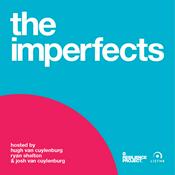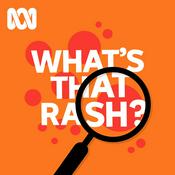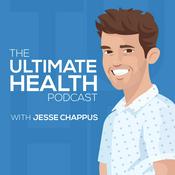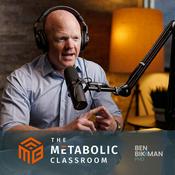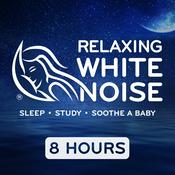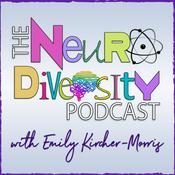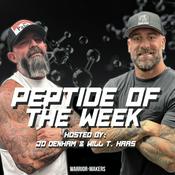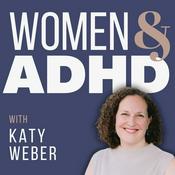Clinical Conversations
The Ambulance Victoria Office of the Medical Director
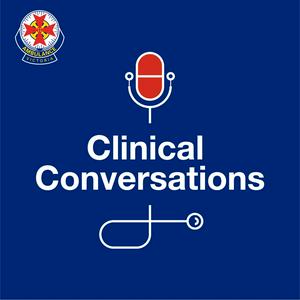
Latest episode
42 episodes
- Your monthly clinical update from James Oswald (Clinical Practice Guideline Specialist) and A/Prof Ben Meadley (Director of Paramedicine).
Cardiac Arrest Update with AV Resuscitation Coordinator Steve Musgrave
Patient Safety Update: Stroke Assessment and Elderly Falls
Alpine and Wilderness Response Alagaesia
Toxicology Evaluation
Alcohol Withdrawal Guideline
Equipment Update: Syringe Drivers
Paper of the Month
Prehospital transesophageal echocardiography versus conventional advanced life support in out-of-hospital cardiac arrest (PHTEE–OHCA) – a randomized controlled pilot study: https://link.springer.com/article/10.1186/s13054-025-05805-w
Professional Development Opportunities
Fast-Tracked Higher Education Pathway for AV Clinical Instructors: https://ambulancevic.sharepoint.com/sites/OneAV-news-and-updates/SitePages/Exciting-Opportunity-Fast-Tracked-Higher-Education-Pathway-for-AV-Clinical-Instructors.aspx?web=1
ACP Primary Care Conference Canberra: 21-22 May
ACPIC Melbourne : 8-11 September
EMS Asia Singapore 7-13 November
Grad Cert MH: https://victoriauniversity.online/ppc/graduate-certificate-mental-health
https://www.latrobe.edu.au/courses/graduate-certificate-in-mental-health#/overview?location=ON&studentType=dom&year=2026
https://online.scu.edu.au/online-courses/graduate-certificate-mental-health
https://handbook.monash.edu/2024/courses/m4039
AICG: Clinical Governance, Effective Leadership, Clinical Education, Clinical Feedback. https://www.aicg.edu.au/education/online-courses/
Get in touch
[email protected]
X / Twitter
James: @JamesOz1
Ben: @ben_meadley
Linkedin
James
Ben
Producer: Liam Hennebry - In this episode of Clinical Conversations, James Oswald and Ambulance Victoria Medical Director Dr David Anderson unpack non-invasive ventilation (NIV) for prehospital care.
They explain the key physiology (oxygenation vs ventilation), the practical difference between CPAP and BiPAP, and how this guides use in COPD, acute pulmonary oedema, COVID, asthma, and undifferentiated dyspnoea. The discussion also covers patient coaching, mask fit troubleshooting, essential monitoring, and how to recognise early success vs failure—including when to escalate and call for help.
Get in touch
[email protected]
Socials
David: @expensivecare | @expensivecare.bsky.social | LinkedIn
James: https://linktr.ee/ClinicalConversations
Producer: Liam Hennebry - Your monthly clinical update from James Oswald (Clinical Practice Guideline Specialist) and A/Prof Ben Meadley (Director of Paramedicine).
Hear from Louise Reynolds (Victoria’s Chief Paramedic Officer) on the women’s pain inquiry findings—and what it means for paramedic practice.
Spotlight the VVED back pain pathway: for many patients, opioids + ED isn’t the answer—community physio support can be surprisingly effective.
Adam Ho (AV Senior Pharmacist) answers the most common medication questions.
Paper of the Month: a must-read on post-intubation hypotension.
Ben runs through key professional development opportunities for 2025 and what’s coming in 2026.
Equipment update.
And we wrap with small steps to transform your practice
Further resources
VVED Back pain pathway presentation (AV employees only): https://engage.cloud.microsoft/main/threads/eyJfdHlwZSI6IlRocmVhZCIsImlkIjoiMzU5OTQ5NzU4NzMzNTE2OCJ9?trk_copy_link=V1
AI Professional Development Courses
Free micro-skill course in AI: https://www.australianindustrygroup.com.au/education-training/centre-for-education-and-training/blog/free-introduction-to-artificial-intelligence-microskill-course
Digital health 101: https://digitalhealthworkforce.org.au/education-and-resources/
Australian Institute of Digital Health AI essentials: https://cpd.digitalhealth.org.au/course/ai-essentials
AI Podcasts
NEJM AI Grand rounds (AI Podcast): https://store.nejm.org/signup/ai/podcasts
Beyond the prompt (AI podcast): https://www.beyondtheprompt.ai/
Paper of the month
Prehospital Postintubation Hypotension and Survival in Severe Traumatic Brain Injury: https://jamanetwork.com/journals/jamanetworkopen/fullarticle/2841682
Ketamine or Etomidate for Tracheal Intubation of Critically Ill Adults: https://www.nejm.org/doi/abs/10.1056/NEJMoa2511420
Get in touch
[email protected]
X / Twitter
James: @JamesOz1
Ben: @ben_meadley
Linkedin
James
Ben
Producer: Liam Hennebry - In our first ever live episode of Clinical Conversations, James Oswald (CPG specialist and paramedic) is joined by Ambulance Victoria Medical Director Dr David Anderson for an end-of-year Q&A on the latest CPG updates.
We work through staff questions on the “why” behind key changes—including respiratory care and oxygen targets, NIV expansion and mask issues, airway and RSI updates (including crash induction and consultation for single-responder MICA), and several medication updates such as magnesium compatibility, levetiracetam after midazolam, IV GTN in APO, and opioid choice and multimodal analgesia. They also cover practical operational issues like VVED wait times and what to do when access delays are affecting crews.
Get in touch
[email protected]
Socials
David: @expensivecare | @expensivecare.bsky.social | LinkedIn
James: https://linktr.ee/ClinicalConversations - Your monthly clinical update from James Oswald (Clinical Practice Guideline Specialist) and A/Prof Ben Meadley (Director of Paramedicine):
02:10 – CPG Update Released
• Highlights major 2025 CPG changes, app issues, and expected three-month transition period (IFS ceases immediately).
• Emphasis on professional judgment, understanding over memorisation, and upcoming live Q&A.
• Request for staff feedback on new learning methods.
05:42 – Women’s Pain Inquiry Findings
• Large Victorian inquiry confirms women’s pain is frequently dismissed; implications for paramedic practice.
06:58 – Registration & Professional Capabilities
• Registration season brings opportunity to review Paramedicine Board capabilities: communication, cultural safety, risk management, lifelong learning.
08:05 – Paper 1: AI ECG for STEMI
• AI ECG analysis outperforms clinicians in complex cases and may reduce cath lab false activations; human–AI collaboration is the future.
10:20 – Paper 2: Community Paramedicine Study
• Time-and-motion study shows community paramedicine is a thinking-intensive role with few interventions.
13:40 – Paper 3: Methoxy vs Fentanyl vs Morphine
• Methoxyfluorane provides fastest early analgesia; supports multimodal pain management with methoxy as a strong first-line option.
17:56 – Equipment Update
• Reminder not to pre-connect sensitive devices (e.g., EtCO₂ adapters, Yankauer) due to temperature and contamination risks.
19:54 – AI Professional Development Workshop
• Upcoming Monash workshop on trustworthy generative AI for healthcare, available in-person and virtually.
Resources
Inquiry into women’s pain: https://www.health.vic.gov.au/inquiry-into-womens-pain
Gender disparities in EMS care: https://pubmed.ncbi.nlm.nih.gov/36369725/
Sex Differences in Patients With Acute Chest Pain: https://www.sciencedirect.com/science/article/pii/S0735109723000839
Professional capabilities: https://www.paramedicineboard.gov.au/Professional-standards/Professional-capabilities-for-registered-paramedics.aspx
Papers of the month
Community paramedicine: https://www.sciencedirect.com/science/article/pii/S2588994X25000909?via%3Dihub
Pain relief study: https://www.sciencedirect.com/science/article/abs/pii/S0140673625015752
AI-Enabled ECG Analysis: https://www.jacc.org/doi/10.1016/j.jcin.2025.10.018
Professional development
Building Trustworthy GenAI for Healthcare Innovation: https://shop.monash.edu/masterclass-building-trustworthy-genai-for-healthcare-innovation.html
Get in touch
[email protected]
James: https://linktr.ee/ClinicalConversations
Ben: @ben_meadley , Ben - Linkedin
Producer: Liam Hennebry
More Health & Wellness podcasts
Trending Health & Wellness podcasts
About Clinical Conversations
The podcast for paramedics and anyone involved in out-of-hospital care that is critical, urgent, or unplanned. Hosted by James Oswald (Paramedic and clinical guideline developer) and A/Prof David Anderson (Medical Director).Keyword: Paramedic, paramedicine, Emergency Medical Service, EMS, Emergency Medical Technician, EMT, prehospital, pre-hospital critical care, retrieval medicine, ambulance, Helicopter Emergency Medical Service, HEMS, air ambulance, emergency, first responder, first aid.
Podcast websiteListen to Clinical Conversations, Passion Struck with John R. Miles and many other podcasts from around the world with the radio.net app

Get the free radio.net app
- Stations and podcasts to bookmark
- Stream via Wi-Fi or Bluetooth
- Supports Carplay & Android Auto
- Many other app features
Get the free radio.net app
- Stations and podcasts to bookmark
- Stream via Wi-Fi or Bluetooth
- Supports Carplay & Android Auto
- Many other app features


Clinical Conversations
Scan code,
download the app,
start listening.
download the app,
start listening.




